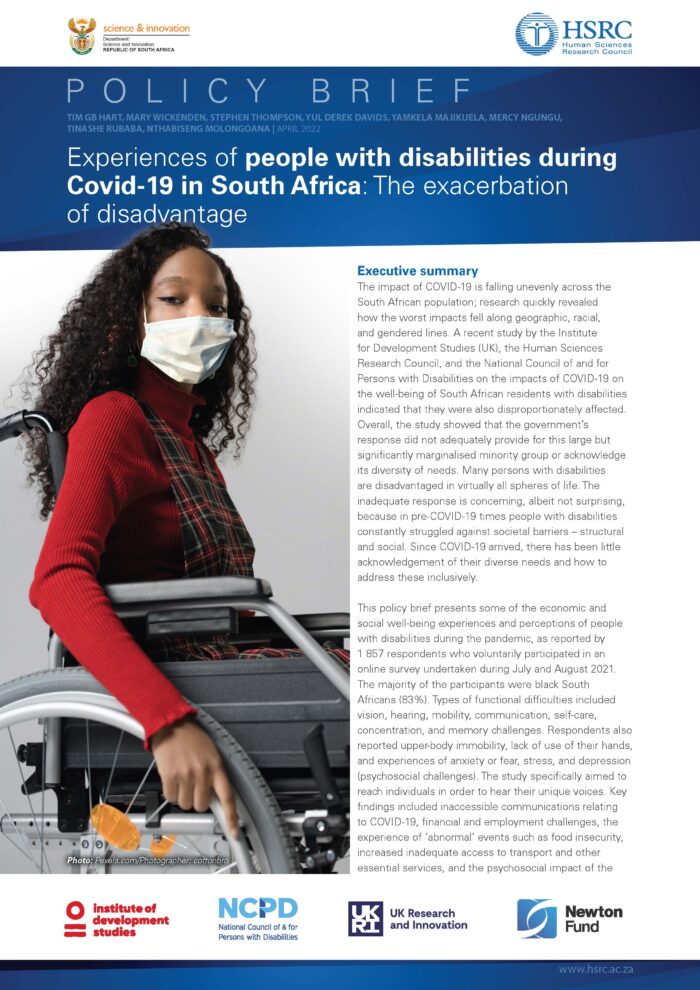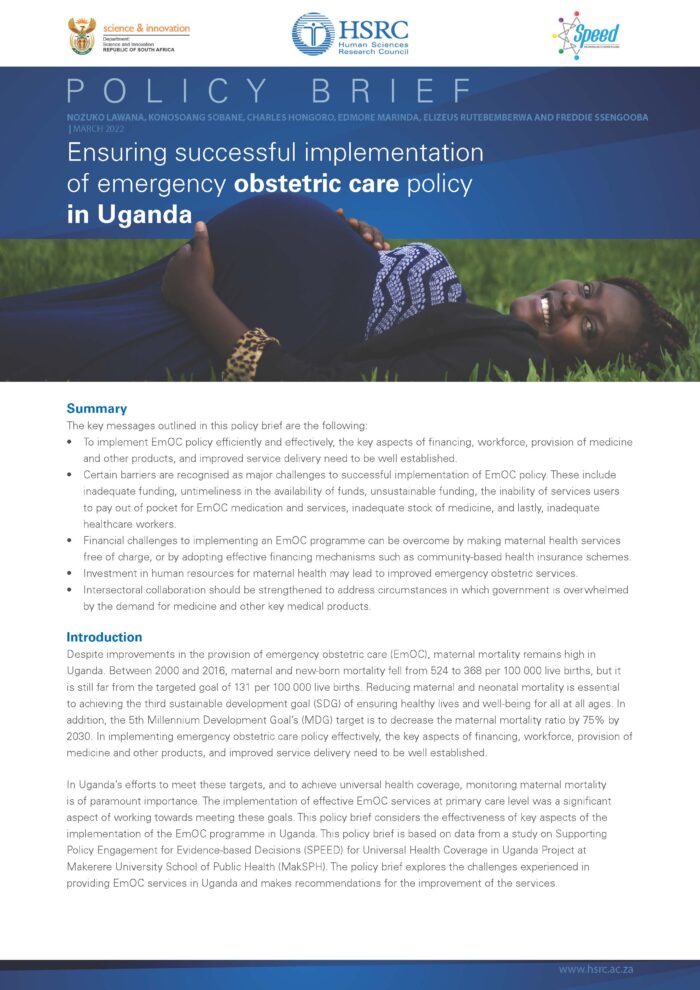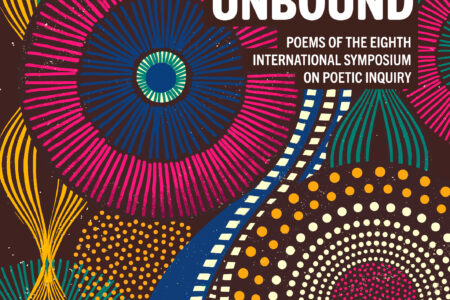What we do
The Science in Society unit, located in the HSRC’s Impact Centre, aims to strengthen the science/society interface and contribute towards enhancing the impact of science. A multi-disciplinary research approach encompasses scholarship related to research impact, science and technology policy, science communication, public perceptions of science, and the social impacts of science and innovation. The knowledge brokering roles of the unit include the development of the HSRC’s policy briefs, the implementation of a formal research/policy engagement structure by the Policy Action Network, a growing focus on evidence review and evidence synthesis that is engaged with policy communities, and institutional support for the HSRC’s impact agenda.
Research Policy interface
The Policy Action Network (PAN) helps government and civil society partners in South Africa develop and implement transformative public policies by connecting them with relevant research, data and people. PAN is an initiative of the HSRC, supported by the Department of Science and Innovation. It was established in 2011 and has provided evidence support in a number of areas related to poverty alleviation and development.
Recent and current projects include:
- Handbook for AI Policy Maker Capacity Building
The handbook forms part of a GIZ AI policy project. The handbook is a key output of a recent capacity building programme and new Africa-Asia AI Policy Maker Network supported by FAIR Forward and the HSRC. It is an open-access resource that can assist with the design and implementation of training programmes on responsible and ethical use of AI. - E-Participation Pilot Projects
The HSRC is the lead implementing entity on an EU-funded project under the Department of Science and Innovation which aims to pilot e-participation in six municipalities across South Africa. - Observatory on Responsible AI
PAN is collaborating with Research ICT Africa and the IDRC to establish an African Observatory on Responsible AI. The Observatory aims to be an open space of engagement, collaboration and critical inquiry on AI in diverse African societies. - Open Data Engagements and Toolkit
PAN is working with partners in the Open Data South Africa initiative to host regular workshops on using data for social impact and policy action. We also maintain the open data toolkit. - Training on Data Journalism
PAN is collaborating with the South African Agency for Science and Technology Advancement to run data journalism workshops for emerging journalists and programme managers from community media houses across the country.

- Innovate Durban Funding Map
PAN collaborated with Innovate Durban, an entity established by eThekwini Municipality, and local innovators to develop a map of innovation funding in South Africa. An updated version of the map was developed in October 2022 and is available on the PAN website. - Evidence Mapping and Synthesis
PAN is working with the Departments of Planning, Monitoring and Evaluation and Cooperative Governance and Traditional Affairs to identify and synthesise evidence related to health systems and local government respectively. The team is applying specific systematic review methodologies for gathering evidence, as well as broader concepts relevant to evidence-informed decision-making support.
HSRC policy briefs
HSRC Policy Briefs synthesise research in a way that is accessible to a broad range of stakeholders, and distil policy recommendations for use by a wide range of decision makers.
View the latest Policy Briefs at:
https://hsrc.ac.za/policy-brief/
Impact
We support the HSRC’s Impact Agenda by:
- Developing and managing impact resources, including online toolkits and practical templates for impact stories, impact case studies, impact statements, and impact pathways
- Hosting internal HSRC engagements about impact
- Managing an internal HSRC capacity development programme
- Participating in national and international for a dedicated to research impact
- Co-ordinating the implementation of the HSRC’s impact strategy

Our research highlights
- Comparative Analysis of Socio-Economic Impact in ATTRACT phase 1 (CASEIA)
The European Horizon 2020 programme has funded the ATTRACT project, which aims to create a co-innovation ecosystem between fundamental research and industrial communities to develop breakthrough technologies for scientific and commercial uses. As part of this project, the HSRC is undertaking research that assesses how the ATTRACT phase-1 paradigm and support mechanism achieved broad-spectrum socio-economic impact at the project level. Through in-depth comparative analysis, we aim to develop new insights into science policy related to scientific research infrastructure innovation ecosystems.
- Health Inequality in South Africa
In partnership with the Bill and Melinda Gates Foundation, the HSRC has initiated a project to understand the impact of health inequalities in South Africa. The Covid 19 emergency highlighted the pervasive influence that inequality has on the capacity of citizens to access health services, which in turn has real impacts on families and on community health. The project aims to review the pandemic experience, provide an opportunity to take stock, and use evidence as a rallying call to inform policymakers, implementers, and the public about the wide-ranging, long-term impacts of a pandemic such as COVID-19. The project is conducting analysis of how testing, access to healthcare and vaccination was inequitable and left many behind based on their income level, gender, race and location. Based on these analyses it will develop and showcase possible innovations to close the gap between current policy and evidence to influence actions going forward to address health inequities in South Africa.
- Science Granting Councils Initiative: Gender and Inclusivity
The Gender and Inclusivity Project of the Science Granting Councils Initiative aims to strengthen the capacities of Science Granting Councils (SGCs) in Sub-Saharan Africa to advance systemic change towards greater gender inclusivity in the science, technology and innovation (STI) sector. As central role players in national systems of innovation, SGCs are key to advancing gender transformation. They contribute to setting and monitoring national research agendas, and stimulate research designs and content responsive to gender inequality through funding projects informed by a gender transformative lens. Building on existing work of SGCs, the Gender and Inclusivity Project supports the mainstreaming of an intersectional transformative approach in the development, implementation and monitoring of gender policy, programmes and research in the functions of SGCs.
- Transformation in the Department of Science and Innovation
In partnership with the Department of Science and Innovation and the Centre for Science Technology and Innovation Indicators (CeSTII), the Impact Centre is undertaking a review of transformation across the DSI and its entities, including public research institutes, science facilities, and technology agencies. AS part of this effort, we are developing a documentary about the work of the Living Catchments project as an example of transformative innovation policy.


Selected publications
- Gastrow, M. and Oppelt, T. 2019. The Square Kilometre Array and Local Development Mandates in the Karoo
Journal of Southern African Studies - Gastrow M., Oppelt, T. 2018. Big science and human development – what is the connection?
South African Journal of Science, 114(11/12) - Gastrow, M., Roberts, B., Reddy, V. & Ismail, S. 2018. Public perceptions of biotechnology in South Africa
South African Journal of Science, Vol. 114 no.1/2 p58-66 - Hongoro, C., Adonis, C., Sobane, K. 2022.
Innovation for Inclusive Development and Transformation in South Africa
Editors, AOSIS Scholarly Books
- Katoto PDMC. et al with Parker S. 2022.
Predictors of COVID-19 vaccine hesitancy in South African local communities: the VaxScenes study
PMID: 35334991 - Lunga, W., Sobane, K. 2022.
The value of developing inclusive innovations for disaster risk communication and management in developing countries
Book chapter, AOSIS Scholarly Books - Plantinga, P. 2022. Digital discretion and public administration in Africa: Implications for the use of artificial intelligence
Information Development
- Plantinga, P. 2022.
Innovation and the Public Service: Facilitating Inclusive Industrial and Social Development
Book chapter, AOSIS Scholarly Books - Sobane, K. Makoe, P. and Van Der Merwe, C. 2022.
The Reproduction of Racial Inequalities through Language of Learning and Teaching at Universities in South Africa
Book chapter, Brill. - Zuma, B. 2021. From apartheid to empire: How (post)apartheid South Africa became an anti-poor black society
Psychology in Society






